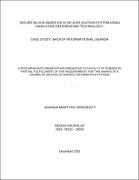| dc.description.abstract | There has been an increase in the design and development of data backup techniques both offline
and on cloud especially in developed countries. Despite the usual problems of poor infrastructure
and technologies, data de-duplication systems designed for the developing world need to
conform to users with different models of data compression, security and usability than those
designed for developed world.
This study investigated data de-duplication across stand alone work stations and mobile devices
with a de-duplication model and an interface that supports the usage and concerns of low literacy
users in developing countries. The main goal of the study is to minimize the amount of storage
capacity that is taken up by files stored multiple times and may be later transferred over the
internet hence consuming bandwidth.
Using block based file chunk, referencing a hash-code for each and every file or data chunk is
generated then stored. This unique hash-code is matched against all existing chunks. When a
match is found, a confirmation of an already existing file is made and file can be backed up only
once.
The findings of the survey of end-users were useful in understanding the current state of practice
in data backup handling, understanding organizational’ needs and requirements, and deciding the
nature of the data de-duplication system to be implemented. The design, development,
implementation and evaluation of the Data De-duplication System (DDS) system were achieved
through a User-Centered Design (UCD) approach, Hash-code Referencing Technology.
The experimental results of the data de-duplication system reveal that the system is useful to
users. Results also demonstrate that DDS can be extended to personal mobile phones in future
for data cost reduction and secure cloud storage of personal data | en_US |


